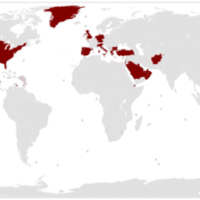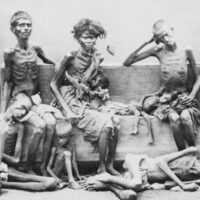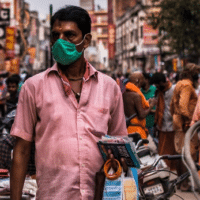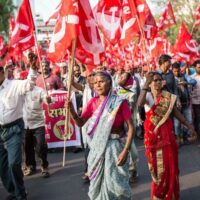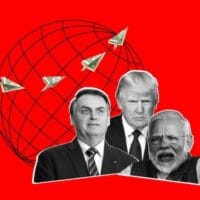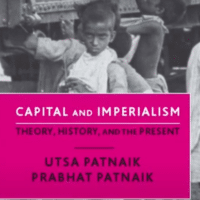-
Imperialism as an abiding phenomenon
The essence of the relationship of imperialism lies in the control over the world’s resources, including land-use, by the metropolitan powers.
-
An unimaginable contrast
Much has been written about the immense increase in economic inequality that has occurred of late and various startling figures have been provided by bodies like Oxfam, which has just come out with a report titled ‘Inequality Kills.’
-
Why capitalist governments worry more about inflation than unemployment?
Capitalist governments invariably seek to control inflation by enlarging unemployment.
-
Social sciences and the colonised mind
A CRUCIAL component of the imperialist system is the colonisation of third world minds that helps to sustain it. This colonisation is pervasive, but here we shall discuss only academic colonisation and that too relating to the social sciences.
-
Financial Markets under capitalism
One of the most important arguments advanced by John Maynard Keynes, the renowned economist, was that the operation of financial markets under capitalism is deeply flawed.
-
Yet another contradiction of capitalism
In the United States there are still four million persons who remain unemployed compared to before the pandemic; and yet the Biden administration’s attempt to stimulate the economy has already run into a crisis with the re-emergence of inflation not just in that country but elsewhere in the capitalist world as well.
-
U.S. inflation and India’s economic recovery
The very day, December 11, when the Indian finance ministry spuriously claimed a robust recovery in the post-pandemic Indian economy, newspapers carried news of an acceleration in the U.S. inflation rate.
-
India’s post-pandemic economic recovery
The pandemic alas is not yet over, but there are no economic disruptions in the current fiscal year in the form of lockdowns or workers’ absence. The economy’s performance therefore can no longer be attributed to the prevalence of the pandemic; whatever it is, it is caused by economic factors.
-
The peasantry’s victory over imperialism
One should scarcely be surprised therefore by the fact that the western media have been so critical of the Modi government for its climbdown.
-
The homogenisation of education
Education in post-independence India was supposed not just to provide knowledge and skills to students, but also to facilitate the process of “nation-building” (to use a clumsy word).
-
Foodstocks, bio-fuels and hunger
THE Modi government’s attempt to “explain” away India’s slipping from being 94th on the world hunger index in 2020 to 101st in 2021, a rank well below that of neighbours Pakistan, Nepal or Bangladesh, by questioning the “methodology” of the index, is jejune enough; but even more shocking is its total inability to see the reason behind the acute hunger in the country.
-
Finance capital and the World Economy
THE period of neo-liberalism witnesses an increase in the share of economic surplus in total output both in individual countries and also for the world as a whole.
-
Peasants and the Revolution
MARXIST theory develops with changing times, as capitalism itself develops, which is why it remains a living doctrine. On the question of the role of the peasantry in the revolutionary process that leads to the transcendence of capitalism, there have been significant developments in Marxist theory, which I propose to discuss here.
-
Everything for sale
EVERYWHERE in the world people got vaccinated against the COVID-19 virus without having to pay a penny, but not in India. Everywhere in the world, historic landmarks that define a nation, that constitute the warp and woof of a nation’s consciousness, are held sacred and left untouched in their original shape, but not in India.
-
Neo-Liberalism and Nationhood
There is a tendency in the West, including even among progressives, to treat all “nationalism” as a homogeneous and reactionary category. They treat even anti-colonial nationalism as if it is no different from European bourgeois nationalism, notwithstanding the several crucial differences between the two.
-
Why neoliberalism needs neofascists
It has been four decades since neoliberal globalization began to reshape the world order. During this time, its agenda has decimated labor rights, imposed rigid limits on fiscal deficits, given massive tax breaks and bailouts to big capital, sacrificed local production for multinational supply chains, and privatized public sector assets at throwaway prices.
-
Imperialism then and now: Capital relocation, inequality, encroachment and protracted crisis – Part 3/3
Prabhat Patnaik shows that as capital is relocated, real wages do not rise, inequality widens, and global demand is suppressed. The system remains in protracted crisis; Keynesianism in the North alone is no solution. The struggle is everywhere.
-
Imperialism then and now: Drain of wealth, depression, the role of the State and globalization – Part 2/3
Imperialism which existed in the colonial era persists to this day and the system cannot do without it.
-
Imperialism Then and Now: Wealth, Unemployment, and Insufficient Demand- Part 1/3
Hello and welcome. I’m Lynn Fries producer of Global Political Economy or GPEnewsdocs. Today’s guest is Prabhat Patnaik. He is talking about his read on the history of capitalism that he breaks up into 5 periods from colonialism into the present.
-
The household and the state
Just as a household cannot “live beyond its means” forever, and sooner or later its creditors not only stop giving loans but take away the assets of the household for defaulting on loan repayment, likewise, the State cannot “live beyond its means” forever and go on borrowing ad infinitum; sooner or later its creditors stop giving loans and even attach its assets.

